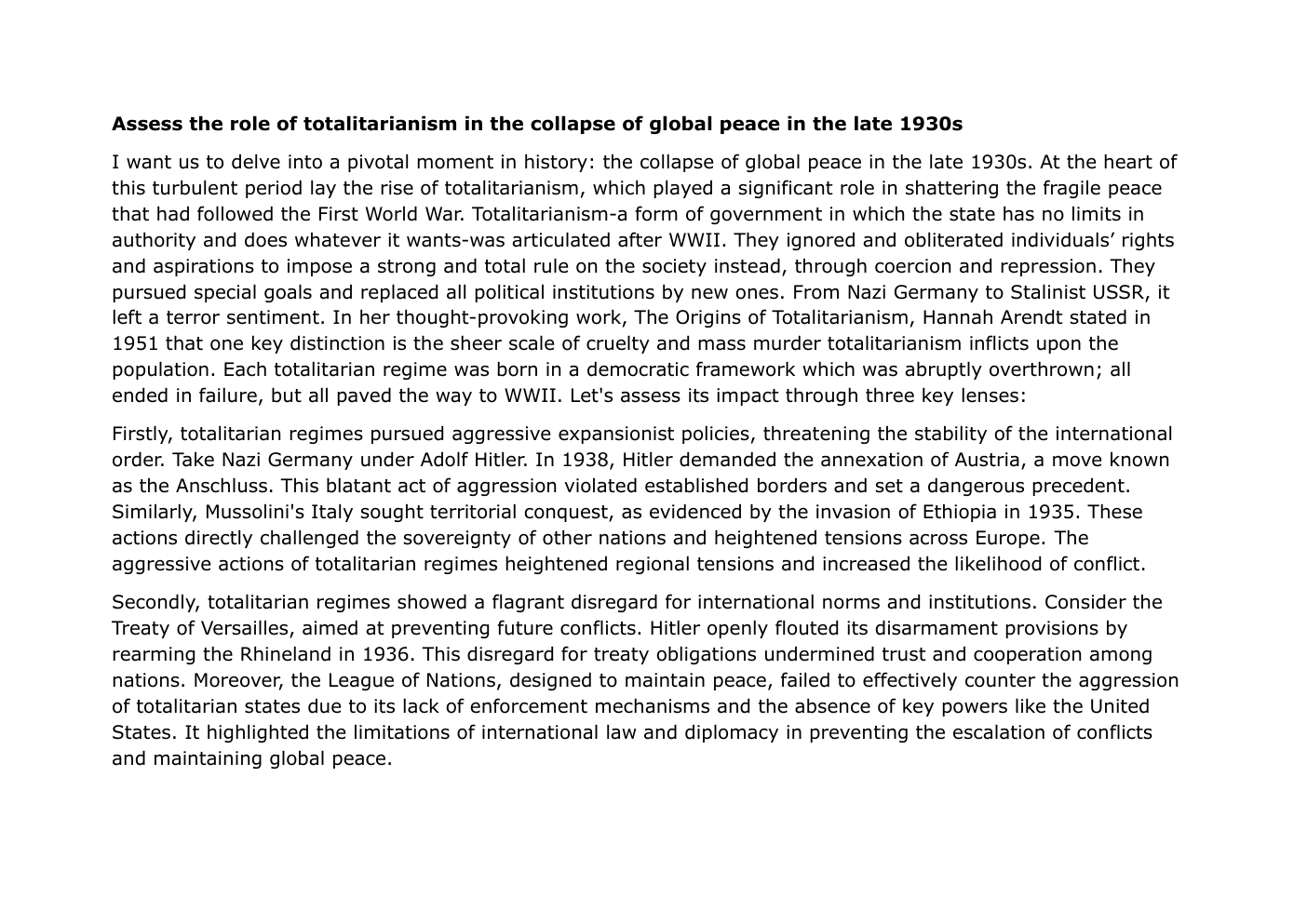Sujet d'oral: Assess the role of totalitarianism in the collapse of global peace in the late 1930s
Publié le 05/05/2024
Extrait du document
«
Assess the role of totalitarianism in the collapse of global peace in the late 1930s
I want us to delve into a pivotal moment in history: the collapse of global peace in the late 1930s.
At the heart of
this turbulent period lay the rise of totalitarianism, which played a significant role in shattering the fragile peace
that had followed the First World War.
Totalitarianism-a form of government in which the state has no limits in
authority and does whatever it wants-was articulated after WWII.
They ignored and obliterated individuals’ rights
and aspirations to impose a strong and total rule on the society instead, through coercion and repression.
They
pursued special goals and replaced all political institutions by new ones.
From Nazi Germany to Stalinist USSR, it
left a terror sentiment.
In her thought-provoking work, The Origins of Totalitarianism, Hannah Arendt stated in
1951 that one key distinction is the sheer scale of cruelty and mass murder totalitarianism inflicts upon the
population.
Each totalitarian regime was born in a democratic framework which was abruptly overthrown; all
ended in failure, but all paved the way to WWII.
Let's assess its impact through three key lenses:
Firstly, totalitarian regimes pursued aggressive expansionist policies, threatening the stability of the international
order.
Take Nazi Germany under Adolf Hitler.
In 1938, Hitler demanded the annexation of Austria, a move known
as the Anschluss.
This blatant act of aggression violated established borders and set a dangerous precedent.
Similarly, Mussolini's Italy sought territorial conquest, as evidenced by the invasion of Ethiopia in 1935.
These
actions directly challenged the sovereignty of other nations and heightened tensions across Europe.
The
aggressive actions of totalitarian regimes heightened regional tensions and increased the likelihood of conflict.
Secondly, totalitarian regimes showed a flagrant disregard for international norms and institutions.
Consider the
Treaty of Versailles, aimed at preventing future conflicts.
Hitler openly flouted its disarmament provisions by
rearming the Rhineland in 1936.
This disregard for treaty obligations undermined trust and cooperation among
nations.
Moreover, the League of Nations, designed to maintain peace, failed to effectively counter the aggression
of totalitarian states due to its lack of enforcement mechanisms and the absence of key powers like the United
States.
It highlighted the limitations of international law and diplomacy in preventing the escalation of conflicts
and maintaining global peace.
Lastly, totalitarian regimes thrived on fostering instability and conflict, both domestically and internationally.
Look
at the Spanish Civil War, a proxy conflict fuelled by competing ideologies.
Totalitarian interventionists, including
Hitler and Mussolini, supported Franco's Nationalist forces, exacerbating tensions, and prolonging....
»
↓↓↓ APERÇU DU DOCUMENT ↓↓↓
Liens utiles
- Grand Oral - MATHS Comment les mathématiques permettent-elles d'optimiser le gain réalisé sur un vol par une compagnie aérienne qui pratique le surbooking ?
- Grand Oral PHYSIQUE-CHIMIE Problématique : Dans quelle mesure la chimie a-t-elle contribué à la résolution de l’affaire du meurtre d’O.J Simpson (malgré les obstacles juridiques et médiatiques durant le procès) ?
- The Buddha of suburbia
- grand oral maths - probabilités - surbooking
- Grand oral : Qu'est ce qu'une ONG ?

































